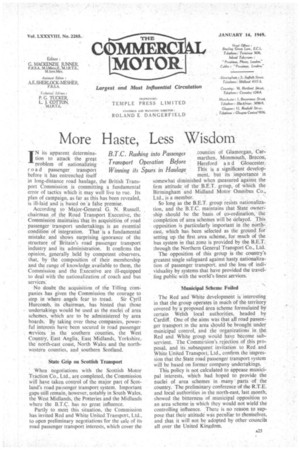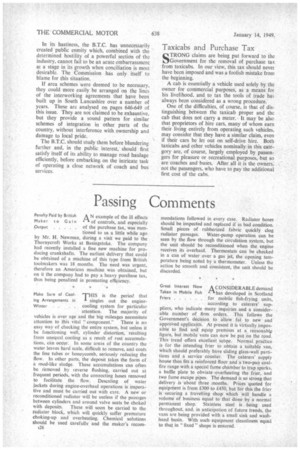More Haste, Less Wisdom
Page 27

Page 28

If you've noticed an error in this article please click here to report it so we can fix it.
IN its apparent determination to attack the great problem of nationalizing road passenger transport before it has entrenched itself in long-distance road haulage. the British Transport Commission is committing a fundamental error of tactics which it may well live to rue. Its plan of campaign, as far as this has been revealed, is ill-laid and is based on a false premise. According to Major-General G. N. Russell. chairman of the Road Transport Executive, the Commission maintains that its acquisition of road passenger transport undertakings is an essential condition of integration. That is a fundamental mistake and shows surprising ignorance of the structure of Britain's road passenger transport industry and its administration. It confirms the opinion, generally held by competent observers. that, by the composition of their membership and the range of knowledge available to them, the Commission and the Executive are ill-equipped to deal with the nationalization of coach and bus services.
No doubt the acquisition of the Tilling companies has given the Commission, the courage to step in where angels fear to -tread. Sir Cyril Hurcomb, its chairman, has hinted that those undertakings would be used as the nuclei of area schemes, which are to be administered by area boards. By taking over those companies, powerful interests have been secured in road passenger ge-rvices in the southern counties, the West Country. East Anglia. East Midlands, Yorkshire. the north-cast coast, North Wales and the northwestern counties, and southern Scotland.
State Grip on Scottish Transport When negotiations with the Scottish Motor Traction Co.. Ltd., are completed, the Commission will have taken. control of the major part of Scotland's road passenger transport system. Important gaps still remain, however, notably in South Wales, the West Midlands, the Potteries and the Midlands where the B.T.C. has no great influence. Partly to meet this situation, the Commission has invited Red and White United Transport, Ltd., to open preliminary negotiations for the sale of its road passenger transport interests, which cover the counties of Glamorgan, Carmarthen, Monmouth, Brecon, Hereford and Gloucester. This is a significant development, but its importance is somewhat diminished when measured against the firm attitude of theB.E.T. group, of which the Birmingham and Midland Motor Omnibus Co., Ltd., is a member.
So long as the B.E.T. group resists nationalization, and the B.T.C. maintains that State ownership should be the .basis of co-ordination, the Completion of area schemes will be delayed. This opposition is particularly important in the northeast, which has been selected as the ground for setting up -the first area scheme, for much of the bus system in that zone is provided by the B.E.T. through the Northern General Transport Co., Ltd. The opposition of this group is the country's greatest single safeguard against hasty nationalization of passenger transport. and the loss of individuality by systems that have provided the travelling public with the world's finest services.
Municipal Scheme Foiled The Red and White development is interesting in that the group operates in much of the territory covered by a proposed area scheme formulated by certain Welsh local authorities, headed by Cardiff. One of the aims was that all road passenger transport in the area should be brought under municipal control, and the organizations in the Red and White group would have become subservient. The Commission's rejection of this proposal, and its subsequent invitation to Red and White United Transport, Ltd., confirm the impression that the State road passenger transport system will be based on former company undertakings.
This policy is not calculated to appease municipal interests, which had hoped to provide the nuclei of area schemes in many parts of the country. The preliminary conference of the R.T.E. and local authorities in the north-east, last month, showed the bitterness of municipal opposition to an area scheme in which they would not wield the controlling influence. There is no reason to suppose that their attitude was peculiar to themselves. and that it will not be adopted by other councils all over the United Kingdom. In its hastiness, the B.T.C. has unnecessarily created public enmity which, combined with the determined hostility of a powerful section of the industry, cannot fail to be an acute embarrassment at a stage in its growth when conciliation is most desirable. The Commission has only itself to blame for this situation.
If area schemes were deemed to be necessary, they could more easily be arranged on the lines of the interworking agreements that have been built up in South Lancashire over a number of years. These are analysed on pages 646-649 of this issue. They are not claimed to be exhaustive, but they provide a sound pattern for similar schemes of integration in other parts of the country, without interference with ownership and damage to local pride.
The B.T.C. should study them before blundering further and, in the public interest, should first satisfy itself of its ability to manage road haulage efficiently, before embarking on the intricate task of operating a close network of coach and bus services.
Taxicabs and Purchase Tax
STRONG claims are being put forward to the Government for the removal of purchase tax from taxicabs. In our view, this tax should never have been imposed and was a foolish mistake from the beginning.
A cab is essentially a vehicle used solely by the owner for commercial purposes, as a means for his livelihood, and to tax the tools of trade has always been considered as a wrong procedure.
One of the difficulties, of course, is that of distinguishing between the taxicab proper and the cab that does not carry a meter. It may be also that proprietors of hire ears, many of whom earn their living entirely from operating such vehicles, may consider that they have a similar claim, even if their cars be let out on self-drive hire. Both taxicabs and other vehicles nominally in this category are, of course, largely employed by passengers for pleasure or recreational purposes, but so are coaches and buses. After all it is the owners. not the passengers, who have to pay the additional first cost of the cabs.




























































































